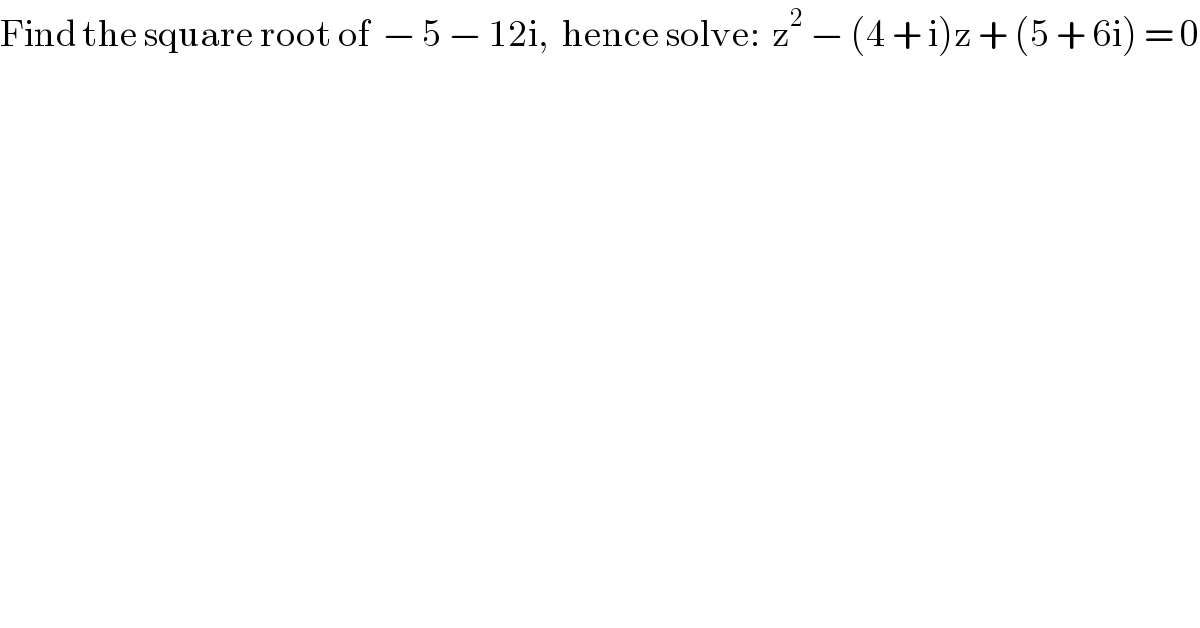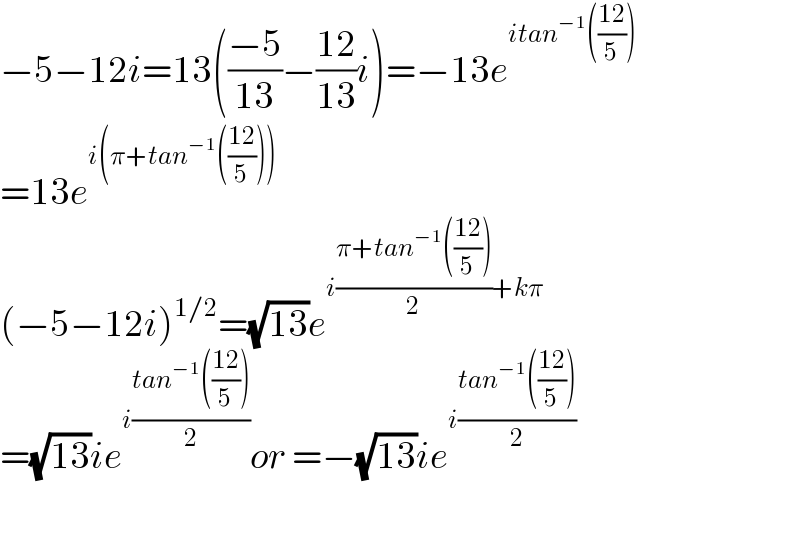
Question Number 47433 by Tawa1 last updated on 09/Nov/18

$$\mathrm{Find}\:\mathrm{the}\:\mathrm{square}\:\mathrm{root}\:\mathrm{of}\:\:−\:\mathrm{5}\:−\:\mathrm{12i},\:\:\mathrm{hence}\:\mathrm{solve}:\:\:\mathrm{z}^{\mathrm{2}} \:−\:\left(\mathrm{4}\:+\:\mathrm{i}\right)\mathrm{z}\:+\:\left(\mathrm{5}\:+\:\mathrm{6i}\right)\:=\:\mathrm{0} \\ $$
Commented by peter frank last updated on 10/Nov/18

$$\mathrm{let}\:\mathrm{a}+\mathrm{ib}=\sqrt{-\mathrm{5}−\mathrm{12i}} \\ $$$$\mathrm{a}^{\mathrm{2}} −\mathrm{b}^{\mathrm{2}} +\mathrm{2abi}=-\mathrm{5}−\mathrm{12i} \\ $$$$\mathrm{by}\:\mathrm{comparison} \\ $$$$\mathrm{a}^{\mathrm{2}} −\mathrm{b}^{\mathrm{2}} =-\mathrm{5}......\left(\mathrm{1}\right) \\ $$$$\mathrm{2abi}=-\mathrm{12i}\Rightarrow\mathrm{2ab}=-\mathrm{12}....\left(\mathrm{2}\right) \\ $$$$\mathrm{a}=\left(\pm\mathrm{2}\:\mathrm{or}\pm\mathrm{3}\right) \\ $$$$\mathrm{b}=\left(\pm\mathrm{3}\:\mathrm{or}\pm\mathrm{2}\right) \\ $$$$\:\:\:\:\:\:\mathrm{a}+\mathrm{ib}=\pm\left(\mathrm{2}+\mathrm{3i}\right)\:\mathrm{or}\pm\left(\mathrm{3}+\mathrm{2i}\right) \\ $$$$ \\ $$$$ \\ $$
Commented by Tawa1 last updated on 10/Nov/18

$$\mathrm{God}\:\mathrm{bless}\:\mathrm{you}\:\mathrm{sir} \\ $$
Commented by maxmathsup by imad last updated on 10/Nov/18

$$\mid−\mathrm{5}−\mathrm{12}{i}\mid=\sqrt{\mathrm{25}+\mathrm{144}}=\sqrt{\mathrm{169}}=\mathrm{13}\:\Rightarrow−\mathrm{5}−\mathrm{12}{i}\:=\mathrm{13}\left(−\frac{\mathrm{5}}{\mathrm{13}}\:−\frac{\mathrm{12}}{\mathrm{13}}{i}\right)={r}\:{e}^{{i}\pi} \left(\frac{\mathrm{5}}{\mathrm{13}}+\frac{\mathrm{12}}{\mathrm{13}}{i}\right){and} \\ $$$$\frac{\mathrm{5}}{\mathrm{13}}+\frac{\mathrm{12}}{\mathrm{13}}{i}={e}^{{i}\theta} \:\:\:{wih}\:{r}=\mathrm{13}\:{and}\:{cos}\theta\:=−\frac{\mathrm{5}}{\mathrm{13}}\:\:{and}\:{sin}\theta\:=−\frac{\mathrm{12}}{\mathrm{13}}\:\Rightarrow{tan}\theta=\frac{\mathrm{12}}{\mathrm{5}} \\ $$$${and}\:{r}=\mathrm{13}\:{and}\:\theta={arctan}\left(\frac{\mathrm{12}}{\mathrm{5}\:}\right)\:\Rightarrow−\mathrm{5}−\mathrm{12}{i}\:=\mathrm{13}{e}^{{i}\left(\pi\:+{arctan}\left(\frac{\mathrm{12}}{\mathrm{5}}\right)\right.} \:\Rightarrow \\ $$$$\sqrt{−\mathrm{5}−\mathrm{12}{i}}=\overset{−} {+}\sqrt{\mathrm{13}}{e}^{{i}\left(\frac{\pi}{\mathrm{2}}+\frac{\mathrm{1}}{\mathrm{2}}{arctan}\left(\frac{\mathrm{12}}{\mathrm{5}}\right)\right)} \\ $$$${for}\:{the}\:{equation}\:{z}^{\mathrm{2}} −\left(\mathrm{4}+{i}\right){z}+\mathrm{5}+\mathrm{6}{i}\:=\mathrm{0} \\ $$$$\Delta\:=\left(\mathrm{4}+{i}\right)^{\mathrm{2}} −\mathrm{4}\left(\mathrm{5}+\mathrm{6}{i}\right)\:=\mathrm{16}+\mathrm{8}{i}−\mathrm{1}−\mathrm{20}−\mathrm{24}{i}\:=−\mathrm{5}+\mathrm{16}{i}\:\:\Rightarrow \\ $$$${z}_{\mathrm{1}} =\frac{\mathrm{4}+{i}+\sqrt{−\mathrm{5}+\mathrm{16}{i}}}{\mathrm{2}}\:{and}\:{z}_{\mathrm{2}} =\frac{\mathrm{4}+{i}−\sqrt{−\mathrm{5}+\mathrm{16}{i}}}{\mathrm{2}} \\ $$$${we}\:{see}\:{there}\:{no}\:{relation}\:{between}\:{the}\:\mathrm{2}\:{Questions}.. \\ $$
Commented by Tawa1 last updated on 10/Nov/18

$$\mathrm{God}\:\mathrm{bless}\:\mathrm{you}\:\mathrm{sir}.\:\:\:\mathrm{The}\:\mathrm{correct}\:\mathrm{question}\:\mathrm{should}\:\mathrm{be}. \\ $$$$\mathrm{z}^{\mathrm{2}} \:−\:\left(\mathrm{4}\:+\:\mathrm{i}\right)\mathrm{z}\:+\:\left(\mathrm{5}\:+\:\mathrm{5i}\right)\:=\:\mathrm{0}.\:\:\:\:\:\mathrm{Please}\:\mathrm{check}\:\mathrm{sir}.\:\:\mathrm{God}\:\mathrm{bless}\:\mathrm{you} \\ $$
Commented by maxmathsup by imad last updated on 10/Nov/18

$${let}\:{z}^{\mathrm{2}} −\left(\mathrm{4}+{i}\right){z}\:+\mathrm{5}+\mathrm{5}{i}\:=\mathrm{0} \\ $$$$\Delta\:=\left(−\left(\mathrm{4}+{i}\right)\right)^{\mathrm{2}} −\mathrm{4}\left(\mathrm{5}+\mathrm{5}{i}\right)=\mathrm{16}+\mathrm{8}{i}−\mathrm{1}−\mathrm{20}−\mathrm{20}{i}=−\mathrm{5}−\mathrm{12}{i}\:{and}\:{the}\:{roots} \\ $$$${of}\:{this}\:{equation}\:{are}\:{z}_{{k}} =\overset{−} {+}\sqrt{\mathrm{13}}\:{e}^{{i}\left(\frac{\pi}{\mathrm{2}}\:+\frac{\mathrm{1}}{\mathrm{2}}{arctan}\left(\frac{\mathrm{12}}{\mathrm{5}}\right)\right)} \:\:=\overset{−} {+}{i}\:\sqrt{\mathrm{13}}\:{e}^{\frac{{i}}{\mathrm{2}}{arctan}\left(\frac{\mathrm{12}}{\mathrm{5}}\right)} \:. \\ $$
Commented by Tawa1 last updated on 10/Nov/18

$$\mathrm{God}\:\mathrm{bless}\:\mathrm{you}\:\mathrm{sir} \\ $$
Answered by Smail last updated on 10/Nov/18

$$−\mathrm{5}−\mathrm{12}{i}=\mathrm{13}\left(\frac{−\mathrm{5}}{\mathrm{13}}−\frac{\mathrm{12}}{\mathrm{13}}{i}\right)=−\mathrm{13}{e}^{{itan}^{−\mathrm{1}} \left(\frac{\mathrm{12}}{\mathrm{5}}\right)} \\ $$$$=\mathrm{13}{e}^{{i}\left(\pi+{tan}^{−\mathrm{1}} \left(\frac{\mathrm{12}}{\mathrm{5}}\right)\right)} \\ $$$$\left(−\mathrm{5}−\mathrm{12}{i}\right)^{\mathrm{1}/\mathrm{2}} =\sqrt{\mathrm{13}}{e}^{{i}\frac{\pi+{tan}^{−\mathrm{1}} \left(\frac{\mathrm{12}}{\mathrm{5}}\right)}{\mathrm{2}}+{k}\pi} \\ $$$$=\sqrt{\mathrm{13}}{ie}^{{i}\frac{{tan}^{−\mathrm{1}} \left(\frac{\mathrm{12}}{\mathrm{5}}\right)}{\mathrm{2}}} {or}\:=−\sqrt{\mathrm{13}}{ie}^{{i}\frac{{tan}^{−\mathrm{1}} \left(\frac{\mathrm{12}}{\mathrm{5}}\right)}{\mathrm{2}}} \\ $$$$ \\ $$
Commented by Tawa1 last updated on 10/Nov/18

$$\mathrm{God}\:\mathrm{bless}\:\mathrm{you}\:\mathrm{sir} \\ $$
